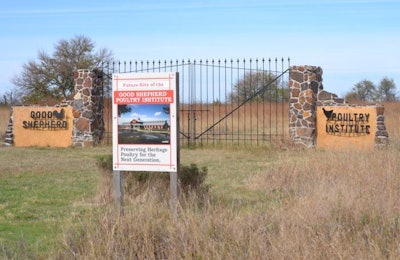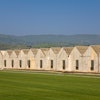
In an effort to give people more hands-on lessons on raising heritage turkeys and chickens, Kansas poultry farmer Frank Reese has been working with Farm Forward to establish what will be known as the Good Shepherd Poultry Institute.
The planned facility will be located on what is now a pasture just west of Reese’s Good Shepherd Poultry Ranch, near the Central Kansas community of Lindsborg.
A sign and entrance has already been erected at the site. Meanwhile, Farm Forward, a Salt Lake City-based organization committed to promoting sustainable animal agriculture that is an alternative to modern industrial production, has been busy raising funds in order to make the vision a reality.
“There’s not really an infrastructure left to teach people how to [produce heritage poultry],” said Andrew deCoriolis, Farm Forward’s director of strategic projects and engagements. “The ag schools have been concentrating on conventional ag research and production methods for 40 years now. Nobody really knows how to do this anymore. We need to retrain a generation of farmers to do this kind of production and husbandry.”
And Farm Forward sees Reese as an ideal mentor for those wanting to learn this type of poultry production.
A lifelong love of poultry
Reese is an anomaly.
The fourth-generation farmer, rather than following the industry norms of commercial poultry production, has continued to raise the varieties of turkeys and chickens he first became interested in at a very young age.
“If my parents couldn’t find me, they’d check the poultry barn. I was always fascinated with chickens and turkeys,” Reese said. "In 10 years in 4-H, I was very competitive. If I was to show, I was going to win, so I got to know a lot of what I consider the master breeders of standard-bred poultry, and especially turkeys.”

Frank Reese stands with some of the Bronze toms he raises at the Good Shepherd Poultry Ranch near Lindsborg, Kansas. | Roy Graber
One of those master breeders had a particular influence on Reese: fellow Kansan Norman Kardosh, who has helped Reese with a lot of his breeding decisions.
Today, Reese raises chickens, turkeys, ducks and geese at the Good Shepherd Poultry Ranch. His chicken breeds include Barred Plymouth Rock, New Hampshire, white and dark Cornish Game, Columbia Wyandotte, and white and black jersey giants. His turkey varieties include standard bronze, white Holland, Narragansett, black and bourbon red.
With about decades of experience and active in the American Poultry Association (APA), Reese is now considered a master breeder of heritage poultry, although he admits he hates the term “heritage” and instead prefers “standard-bred.”
The vision for the Good Shepherd Poultry Institute
Because of his expertise with standard-bred poultry, Reese, on multiple occasions, was asked to give lectures about his knowledge. That’s when he decided that in order to assure that standard-bred chickens and turkeys still had a future, something different needed to be done.
“On my flight back [from one of his speaking engagements], I thought ‘this is a total waste of time,’” Reese said. “These people I was talking to didn’t understand a word I was saying. You can’t teach people to do this in a two-hour lecture. You just can’t.”
To further illustrate his point, Reese explained how his mentor, Norman Kardosh, would come to his farm every fall to help him pick out which turkeys to send to slaughter and which ones to keep on hand as breeders.
Kardosh passed away about 10 years ago, and the last time he went to Reese’s farm, Reese caught the turkeys, and brought them to Kardosh. Reese explained to him why he felt each turkey would be one to keep as a breeder.
“He said ‘you’re finally learning,’ and I said ‘Isn’t that great? It only took me 40 years to understand,’” Reese said.
Farm Forward, deCoriolis said, had been communicating with Reese for about a decade after the organization’s CEO, Aaron Gross, consulted with him as he wrote a book.
The organization became impressed with the work Reese was doing and realized how much knowledge he had about heritage poultry production, as well as how much others sought his advice.
“He gets emails every week from farmers across the country who want to learn about heritage poultry,” said deCoriolis. “They have questions about best management practices, how to dress the birds, market them and how to cook them.”
Helping address demand for slower-growing poultry
The idea of the poultry institute is not just viewed as a way to preserve standard-bred poultry production principles. It is also a means to help the U.S. poultry industry meet the growing demand for slower-growing poultry breeds, deCoriolis said.
Farm Forward has advocated for slower-growing broiler and turkey breeds as a more animal-welfare-minded approach, and heritage poultry breeds meet that criteria, deCoriolis said.
“Frank really made chicken genetics and poultry genetics the centerpiece of our advocacy,” he said.
While the animal welfare community, and to some extent the consumer movement, is pushing more for slower-growing broilers than slower-growing turkeys, deCoriolis says he thinks as more broiler production is shifted toward slower-growing breeds, the demand for slower-growing turkey varieties will follow. It would be similar to the pattern of the two industries concerning a shift toward raised without antibiotics production.
Good Shepherd Poultry Institute facility plans
While a sign is already in place on the property, much of the planning is still in the works, deCoriolis said.
“A lot is still to be determined, but right now the vision is that the building will be the centerpiece of several multi-faceted programs,” he said. “It will have classroom space, potentially dormitory space where people can stay for longer periods of time, and we’ll have a demonstration space where Frank can bring in birds to the barn and show what good confirmation looks like.”

An artist offers its rendering of what the proposed Good Shepherd Poultry Institute would look like when completed. | Photo courtesy of Farm Forward
The hope is to host workshops and more intensive programs for people raising heritage poultry for commercial production.
Farm Forward would like to be able to open the institute up to the public for tours and to enter into partnerships with agricultural schools that would be interested in working with the institute for programs for students wanting to raise heritage poultry.
Funds are still being raised for the institute, deCoriolis said, and to date several significant contributions have been given. No deadlines have been given for the official groundbreaking for the building or construction plans, but deCoriolis is optimistic that ground can be broken early in 2018.
Read more:
A turning point in what has been gained in poultry breeding, www.WATTAgNet.com/articles/28973


















